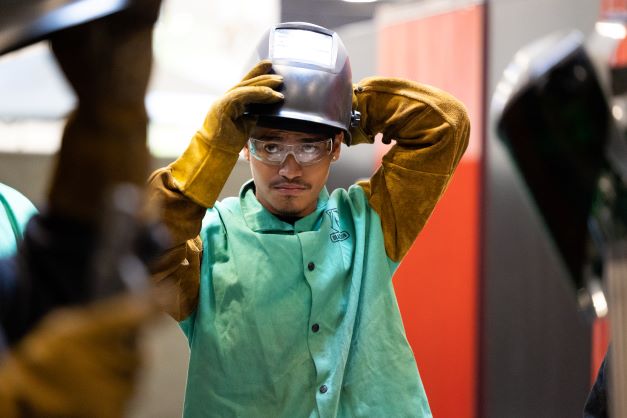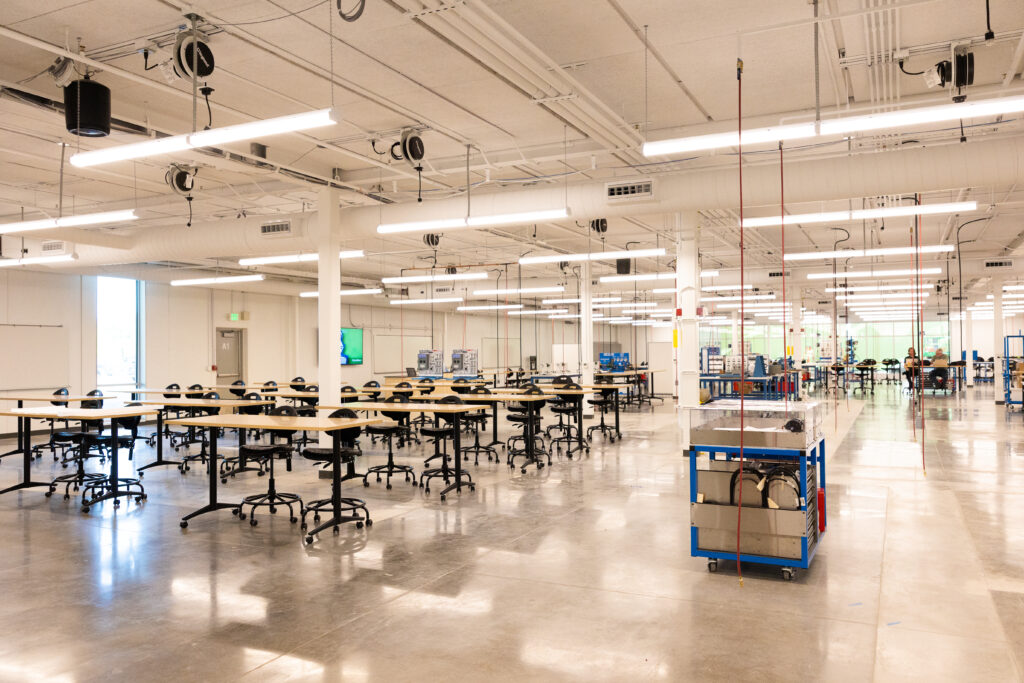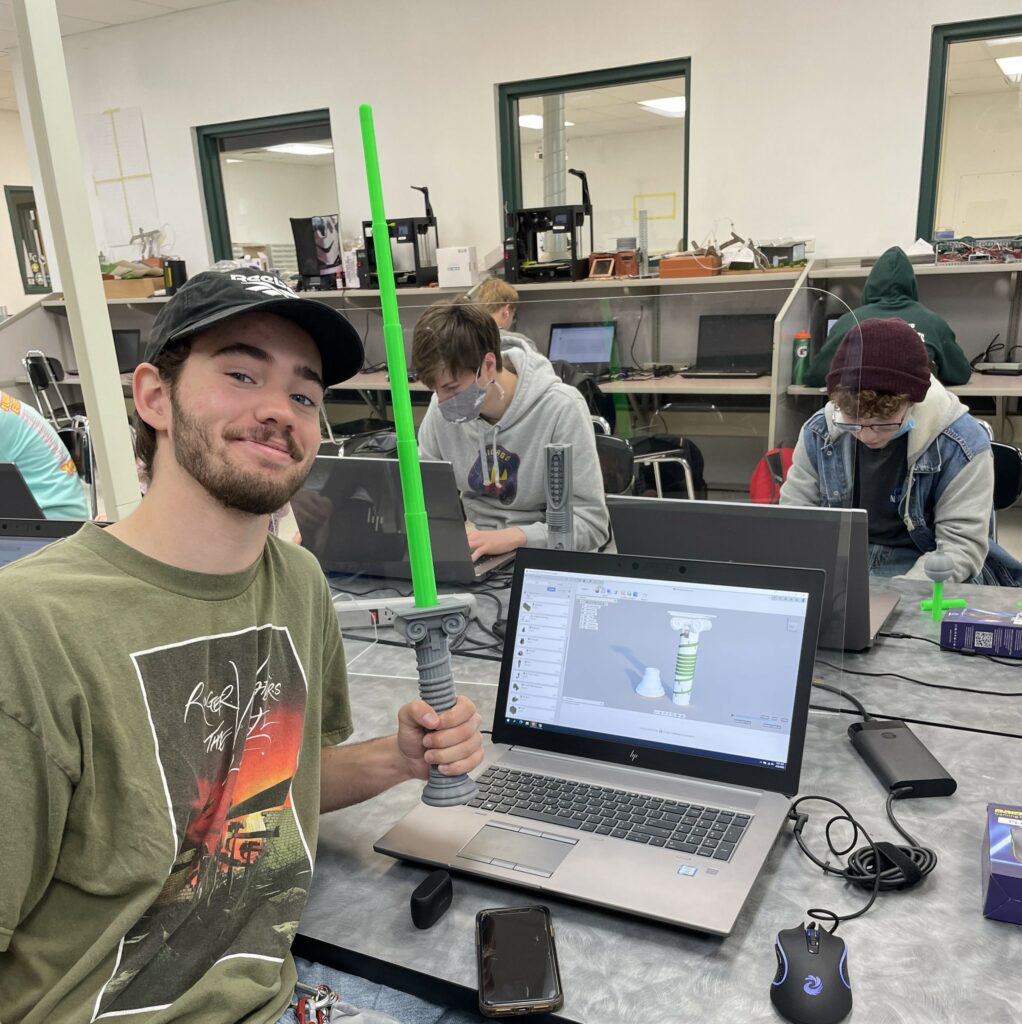This editorial was authored by Lake County Partners, and featured in the Illinois Manufacturers’ Association’s Illinois Manufacturer First Quarter 2023 Publication.
As one of Illinois’ largest industry sectors, manufacturing is a pillar of the state’s economy. It supports nearly 30% of all jobs in Illinois, and has an even greater share in Lake County where local production is dominated by pharmaceuticals, plastic products and medical equipment thanks to the presence of globally-recognized leaders like Abbott, AbbVie, AkzoNobel and Baxter. Those giants are in good company among high-performers like Novelis, Echo, HydraForce, Laser Precision, Yaskawa, Zebra and many others.

Manufacturing employs nearly 100,000 in Lake County, which is among the highest concentrations in the state. An impressive one in every seven Lake County jobs is now in manufacturing. Locally, the industry’s labor force has grown 3.6% over the last year alone, representing 2,200 new workers. The increased employment base will go a long way towards supporting manufacturing businesses in Lake County, but we cannot rest on our laurels if we wish to stoke the growth.
Illinois Manufacturers’ Association (IMA) projections indicate that some manufacturing occupations could see up to a 20% increase in employment growth over the next six years. To meet the demand for talent, Lake County leaders have partnered on cutting-edge solutions to foster growth and workforce development. Collectively, the following five initiatives serve as a model that other communities can use to support the surge in manufacturing and meet the needs that accompany such a tremendous uptick in production:
1. Form Innovative Partnerships to Develop Talent
Through our close relationships with local manufacturers, we know that workforce is often the biggest asset or impediment to growth. For this reason, Lake County Partners has spearheaded a partnership with the College of Lake County, Lake County Workforce Development, the Lake County Tech Campus and area high schools—under the umbrella of the “Lake County Workforce Ecosystem”—to align training with in-demand skills and put employers directly in touch with talent and upskilling opportunities.
A core focus of Lake County Partners is meeting directly with business leaders to discuss challenges, and then using that intelligence to take action that strengthens the local business climate. Through our close relationships in the Workforce Ecosystem, we can quickly assemble tailored solutions related to recruitment, site selection, infrastructure, financing and incentives that make it easier for businesses to grow in Lake County. Connect with us here to schedule a quick call with us and tap into our free business resources and connections.
2. Invest in Education
Businesses are only as healthy as the workforce that supports them. The College of Lake County (CLC) is a key player in the Workforce Ecosystem and a long-time leader in community education. The school has leaned on creative, out-of-the-box thinking to strategically invest in talent development and arm students with in-demand skills.
As a result, Lake County now has over 1,000 students in manufacturing programs at the college and high school levels that will go on to fuel business growth. That number only stands to grow, thanks to CLC’s latest endeavor and its crown jewel of manufacturing education: the incredible Advanced Technology Center (ATC) in Gurnee.

The ATC is a former big box store that is being thoughtfully transformed into a 142,000 sq. ft. center for manufacturing education. Nearly 500 community members recently gathered together to celebrate the grand opening of the ATC with a ribbon cutting—fittingly made out of metal and cut apart by a trio of torch wielders, including a student, instructor and CLC president Dr. Lori Suddick. The fanfare is certainly justified.
The ribbon cutting commemorates phase 1 of the ATC, which engaged local manufacturers to strengthen Lake County’s workforce by providing industry-relevant career pathways focused on industrial technology, fabrication, and welding. Phase 2 of the project, currently under consideration, will reimagine the other half of the facility and reflect the input from the broader community and local manufacturing leaders.
In the short time since the ATC opened, its impact has been immense—prior to its existence, CLC averaged 115 welding students. This semester, which is the first-time offering classes at the ATC, there are over 200 students. With the launch of the new program and facility, CLC can teach and train upward of 700 students annually.
CLC also offers dual credit partnerships with 24 high schools in more than 40 academic areas—that encompasses 2,200+ high school students who are enrolled in dual credit classes that both reduce the time students spend completing certifications and provide an annual savings of approximately $1.5 million for students and families.
These programs were intentionally designed with multiple entry and exit points to meet the educational needs of a variety of students. The coursework to complete credentials is purposefully sequenced so that students can earn one or more certificates on the way to completing either an Associate in Applied Science or Associate in Science degree.
The power of dual credit partnerships can be seen in CLC’s relationship with the nearby Lake County Tech Campus. Tech Campus students can earn up to 9 college credits at no cost through CLC. Credentials are stackable, so students can use them to supplement post-secondary education as they zero in on a long-term career path.
The Tech Campus is well-regarded as one of the best career and technical education training facilities in the Midwest. It was established nearly fifty years ago to pool together local educational resources to educate high school students. Today, it is an extension of 22 area high schools spanning Lake and McHenry counties.
This year, the Tech Campus welcomed 1,900 students—its largest cohort in the past 10 years, which solidified its position as the biggest career technical secondary educational center in the entire state of Illinois. It is also the largest career center in the state, both in space and student population.
3. Pioneer Bold New Career Pathways
Communities that lead manufacturing growth won’t do it by staying tethered to traditional models. Dual credit programs are a fantastic way to get young people engaged and foster their interest, but we can’t stop there. Local schools have begun to explore new certifications that provide clear pathways for high school students to pursue a career in manufacturing while benefiting from practical workplace experiences, streamlined connections with area employers and minimal educational costs.
The Illinois School Board of Education (ISBE) has provided a means of establishing these certifications through the Illinois State Career Pathway Endorsement Process. As of earlier this year, twelve schools in the state have moved forward to pilot programs, including Grayslake District 127 in Lake County. The school has leveraged a grant through Ed System NIU to establish a four-step process that results in a seal on a student’s transcript that can distinguish them from other peers entering the field of manufacturing.

The transcript seal is as important as the process itself. In strategically walking students through the steps of the endorsement framework, educators like Gina Schuyler can help them make more informed post-secondary education decisions. Grayslake D127 uses the program YouScience to engage students in 11 brain-based games that align interests and aptitudes across a broad spectrum of career options. The tool begins conversations that students can then explore with the support of a mentor. Grayslake D127 is excited to add to this process with SchooLinks, a career readiness product that can help counselors, CTE teachers, and internship coordinators collaborate more efficiently.
As students take early college credit classes in the form of dual credit, articulated credit or AP credit, they can pursue professional learning experiences outside of the classroom. Examples of career exploration activities include site visits to employers, virtual experiences, career expos, and mock interviews. Team challenges can take place within a lab-based classroom such as a “skills check” through an employer, or through involvement in Career and Technical Student Organizations (CTSOs) such as Skills USA, FBLA, FCCLA or NTHS. Finally, the school ensures students are reading and math ready for post-secondary options.
As other schools in Lake County, including the Tech Campus, begin to embrace the endorsement process for their students, Grayslake is pioneering a discussion with Workforce Ecosystem partners to garner support for the initiative, establish best practices, and chart a path forward that increases participation and support.
To fuel this program and ensure its success, the Workforce Ecosystem is also lining up buy-in from the business community. This is an important step that starts with educating and engaging local business leaders so that they can more quickly tap into Lake County’s extraordinary talent pipeline.
4. Build Diverse Community Support
Engagement is fundamental to establishing clear direction that serves the entire community as a whole. Lake County Partners secured a federal grant to lead the development of a county-wide Comprehensive Economic Development Strategy (CEDS) that has earned the full endorsement of area leaders. The Lake County CEDS supports continued economic prosperity through social initiatives tied to affordable housing, paratransit, early education and other important elements that support manufacturing growth and tie into the ideas included in this article.
5. Keep the Feedback Loop Open
Economic growth doesn’t happen in a vacuum. To build flourishing businesses and vibrant communities, leaders must be open to connecting, discussing and listening. Economic development organizations like Lake County Partners can drive conversations forward by bringing together informed elected officials, business owners, workers, educators and other stakeholders to ensure that training and investments remain relevant, forward-thinking and inspiring.
HOW CAN YOU TAP INTO TALENT IN LAKE COUNTY?
One of the many benefits of operating a business in Lake County, Illinois is access to a strong workforce pipeline. Connect with us here so we can put you in touch with the talent that your company needs to grow.